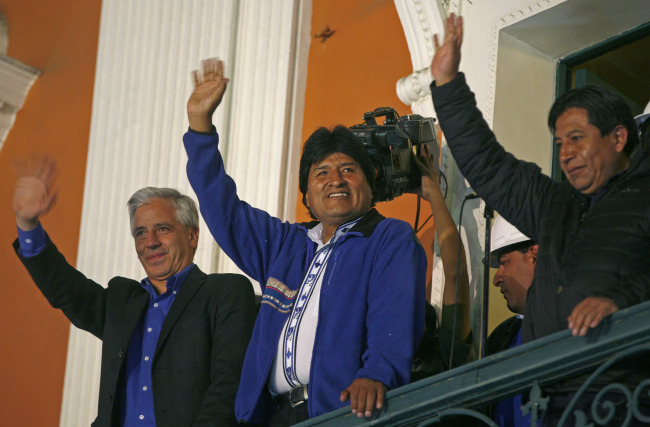EL ALTO, Bolivia (AP) ― Evo Morales easily won an unprecedented third term as Bolivia’s president Sunday on the strength of the economic and political stability brought by his government, according to an unofficial quick count of the vote and an exit poll.
An unofficial quick count by the polling company Ipsos for ATB television gave him 59.5 percent of the vote against 25.3 percent for cement magnate Samuel Doria Medina, the top vote-getter among four challengers.
An exit poll by Equipos Mori for Red Uno television, Unitel and El Deber newspaper gave Morales 61 percent support and Doria Medina 24 percent. The poll had a margin for error of 1.9 percentage points. If confirmed, it would give Morales an outright victory without a second round of voting.
 |
| Bolivia’s President Evo Morales (center) greets supporters from the balcony of the presidential palace in La Paz on Sunday. (AP-Yonhap) |
While known internationally for his anti-imperialist and socialist rhetoric, the 55-year-old coca growers’ union leader raised in poverty is widely popular at home for a pragmatic economic stewardship that spread Bolivia’s natural gas and mineral wealth among the masses.
A boom in commodities prices increased export revenues nine-fold and the country has accumulated $15.5 billion in international reserves. Economic growth has averaged 5 percent annually, well above the regional average.
Half a million people have put poverty behind them since Bolivia’s first indigenous president first took office in 2006, with per capital gross national income up from $1,000 that year to $2,550 in 2013, according to the World Bank.
Public works projects abound, including a satellite designed to deliver Internet to rural schools, a fertilizer plant and La Paz’s gleaming new cable car system. His newest promise: to light up La Paz with nuclear power.
“I voted for Evo Morales because he doesn’t forget the elderly,” said Maria Virginia Velasquez, a 70-year-old widow. Universal old-age pensions ― Velasquez gets $36 a month ― are among the benefits instituted by Morales that have boosted his popularity.
Morales sought Sunday to improve on his previous best showing ― 64 percent in 2009 ― and maintain a two-thirds control of Bolivia’s Senate and assembly.
That would let him change the constitution, which restricts presidents to two 5-year terms, so he can run again.
Morales, a native Aymara from Bolivia’s poor, wind-swept plateau, has not said whether he would seek a fourth term, only that he would “respect the constitution.” He did say in a TV interview last week, however, that he didn’t believe people over the age of 60 should be president.
A court ruled last year that Morales could run for a third term because his first preceded a constitutional rewrite.
All seats are up for grabs in the 36-member Senate and 130-member lower house.
Morales’ critics say he spent tens of millions in government money on his campaign, giving him an unfair advantage. And press freedom advocates accuse him of gradually silencing critical media by letting government allies buy them out, a formula also employed by the ruling socialist heirs in Venezuela of the late Hugo Chavez.
Morales didn’t attend the campaign’s lone presidential debate and state TV didn’t broadcast it.
“There is no functional opposition, left, right or otherwise,” said Jim Shultz, executive director of the left-leaning Democracy Center based in Bolivia and San Francisco.
Morales has capitalized on his everyman image while his Movement Toward Socialism party has consolidated control over state institutions. He long ago crushed and splintered the opposition, nationalized key utilities and renegotiating natural gas contracts to give the government a bigger share of profits.
His image-makers have built a cult of personality around him. Stadiums, markets, schools, state enterprises and even a village bear Morales’ name. In the center of the capital, crews are building a second presidential palace, a 20-story center complete with a heliport.
Yet Morales has alienated environmentalists and many former indigenous allies by promoting mining and a planned jungle highway through an indigenous reserve.
And despite Bolivia’s economic advancements, it is still among South America’s poorest countries. Nearly one in five Bolivians lives on less than a dollar a day.

